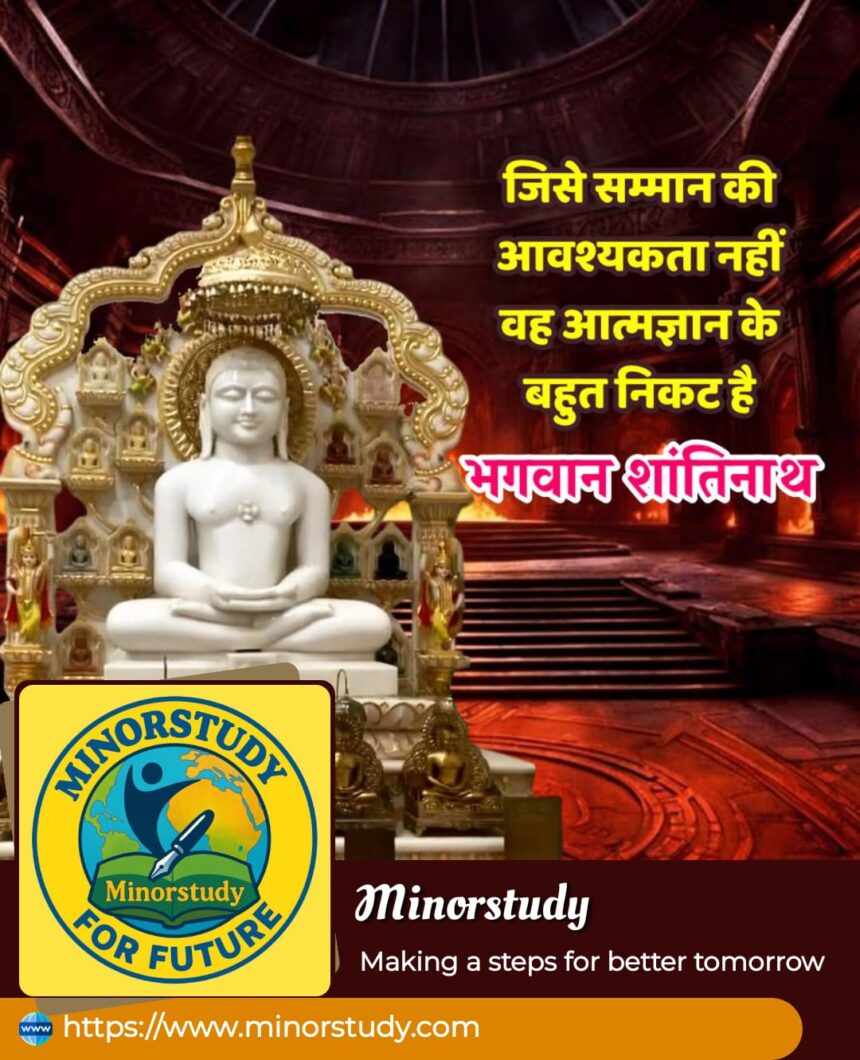7 Liberating Truths from Lord Shantinath: Why Not Seeking Respect Leads to Enlightenment
“He who does not need respect is very close to enlightenment.” – Lord Shantinath
This deep spiritual insight by Lord Shantinath, the 16th Tirthankara of Jainism, offers a powerful truth that challenges the very core of modern human nature. In a world that thrives on validation, recognition, and status, how do we comprehend a mind that desires nothing, not even respect?
- 🕉️ Who is Lord Shantinath?
- 🗓️ Timeline of His Life
- 📚 Historical Context & Spiritual Environment
- 🌟 Meaning Behind the Teaching: “He who does not need respect…”
- 🔥 7 Liberating Truths from Lord Shantinath’s Wisdom
- 1. Respect Craving is Rooted in Ego
- 2. Letting Go Builds True Inner Strength
- 3. Humility is the Gateway to Enlightenment
- 4. Peace is Found in Non-attachment
- 5. A Truly Enlightened Person Seeks No Praise
- 6. Freedom Lies Beyond Dualities
- 7. True Respect Comes to Those Who Don’t Seek It
- 🙋 Frequently Asked Questions (FAQs)
- Q1: Why does Lord Shantinath emphasize not needing respect?
- Q2: Is seeking respect wrong?
- Q3: How can I practically stop seeking respect?
- Q4: Is this teaching relevant in modern life?
- 🧘♂️ Importance in Our Life Today
- 🎯 Societal Significance
- 🧘 Observance and Daily Practices
- 🌸 Wishing Message
- ✅ Conclusion: True Power Lies in Freedom from Recognition
This article explores the history, teachings, significance, and daily relevance of Lord Shantinath’s message and how the act of detaching from the need for respect brings us closer to inner peace and ultimate freedom.
🕉️ Who is Lord Shantinath?
Lord Shantinath is the 16th Tirthankara (spiritual teacher) in the present Avasarpini (descending half of the time cycle) according to Jain cosmology.
Birthplace: Hastinapur (modern-day Uttar Pradesh, India)
Father: King Vishvasen
Mother: Queen Achira
Birth Sign: Deer (symbol of peace and non-violence)
Age at Renunciation: 50 years
Years in Meditation: 9 years
Kevalgyana (omniscience): Attained after intense tapas (austerity)
Moksha (liberation): Achieved on Mount Sammed Shikharji
🗓️ Timeline of His Life
| Milestone | Age/Time |
|---|---|
| Birth | Over 8.4 million years ago (as per Jain time cycles) |
| Coronation as King | Around age 30 |
| Renunciation of World | Age 50 |
| Attained Omniscience | After 9 years of spiritual practice |
| Preached for Thousands of Years | As a Kevalin |
| Attained Moksha | Along with 700 monks |
📚 Historical Context & Spiritual Environment
During Lord Shantinath’s era, society was deeply influenced by violence, ego, and material ambition. Even kings were in a continuous pursuit of respect, dominance, and status. It was in this turbulent environment that Lord Shantinath preached a message of peace, humility, and detachment from ego.
🌟 Meaning Behind the Teaching: “He who does not need respect…”
This teaching challenges ego-driven living.
Desire for respect = dependency on others’ opinions
Letting go of that desire = true self-realization
Lord Shantinath explains that respect is not a measure of self-worth, but a perception shaped by external biases. A person who is free from the craving of honor or validation is no longer trapped in dualities—praise and blame, fame and shame.
This is a major leap toward moksha—the ultimate liberation.
🔥 7 Liberating Truths from Lord Shantinath’s Wisdom
1. Respect Craving is Rooted in Ego
People who constantly seek admiration are slaves to the opinions of others. True freedom comes from valuing self-awareness over self-image.
2. Letting Go Builds True Inner Strength
Those who do not rely on applause develop an unshakable core. They become independent of flattery or criticism.
3. Humility is the Gateway to Enlightenment
Humility isn’t thinking less of yourself—it’s thinking less about yourself. Lord Shantinath promoted egoless living, which allows the soul to shine in its purest form.
4. Peace is Found in Non-attachment
Attachment to titles, roles, and status leads to restlessness. Shantinath taught that peace lies in non-clinging—even to respect.
5. A Truly Enlightened Person Seeks No Praise
Saints, sages, and Tirthankaras never act for applause. Their actions are born from compassion and clarity, not image management.
6. Freedom Lies Beyond Dualities
Fame and insult are two sides of the same coin. Real growth comes when neither affects your state of mind.
7. True Respect Comes to Those Who Don’t Seek It
Ironically, people who don’t chase validation are often the most respected. Why? Because they radiate authenticity, simplicity, and wisdom.
🙋 Frequently Asked Questions (FAQs)
Q1: Why does Lord Shantinath emphasize not needing respect?
Because the need for respect binds the soul to external validation, creating karmic impressions that block liberation.
Q2: Is seeking respect wrong?
Not necessarily. But attachment to respect—being emotionally affected by praise or disrespect—creates suffering and ego.
Q3: How can I practically stop seeking respect?
Practice self-observation and meditation
Be service-oriented without expecting praise
Reflect daily: “Am I doing this for truth, or for appreciation?”
Q4: Is this teaching relevant in modern life?
Absolutely. In the social media age, where likes and followers define self-worth, Lord Shantinath’s wisdom is a powerful antidote.
🧘♂️ Importance in Our Life Today
🧠 Mental Health:
Freeing yourself from others’ opinions reduces anxiety, depression, and overthinking.
🧘 Inner Growth:
It helps cultivate virtues like equanimity, forgiveness, and self-reliance.
👪 Relationships:
Without the ego craving respect, relationships become more authentic, kind, and unconditional.
💼 Career:
Leaders who don’t seek personal glory make ethical, impactful decisions.
🎯 Societal Significance
This teaching is not just individual—it’s revolutionary.
A society where people act without ego or need for honor becomes more just, peaceful, and united.
In politics, education, religion, or media—this principle can transform how we serve and lead.
🧘 Observance and Daily Practices
To walk in Lord Shantinath’s footsteps, one can:
Chant the name “Shantinath” to invite peace and detachment
Practice “Aparigraha” (non-attachment) daily
Read Jain texts like Tattvartha Sutra to deepen understanding
Observe silence for 15 minutes a day—reflect on your ego triggers
Perform good deeds anonymously without expecting recognition
🌸 Wishing Message
✨ On the sacred path of self-realization, may you rise above the desire for external praise.
✨ May Lord Shantinath bless you with the strength to walk the path of humility, detachment, and clarity.
✨ May you glow not because others see you, but because your inner light shines eternally.
✅ Conclusion: True Power Lies in Freedom from Recognition
Lord Shantinath’s life is a message in itself—from royal grandeur to renunciation, from seeking kingdom to seeking truth. His teaching reminds us that true respect is internal. You are already divine; you don’t need external stamps to prove it.
🕊️ “He who does not need respect is very close to enlightenment.”
Let this be your mantra in a world where people live to impress.
Real power comes not from being noticed, but from being free.








